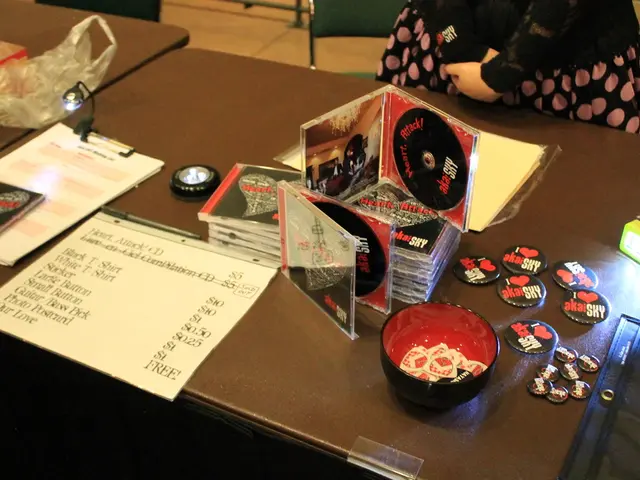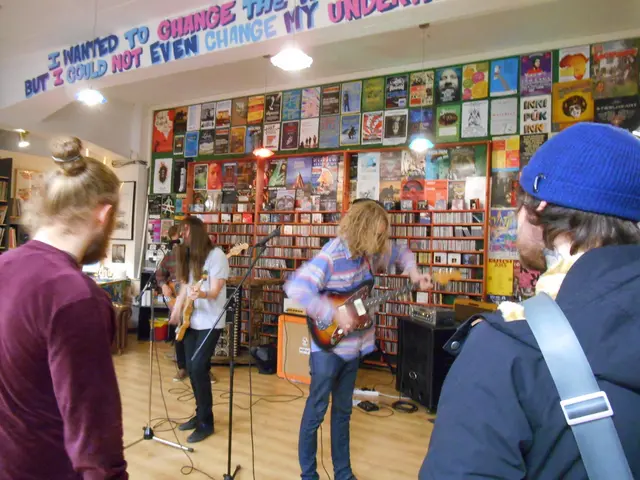Tunes of Intense Electronic Dance Music in Various Video Games
In the world of video games, the history of soundtracks is deeply rooted in the development of electronic music and early computing technology. This fascinating journey has seen pioneering electronic artists and influential soundtracks shape the medium, creating an emotional and immersive experience for players.
The origins of video game music can be traced back to the mid-1970s and 1980s, a period often referred to as the golden age of arcade games. Early examples such as Tomohiro Nishikado's *Gun Fight* and *Space Invaders* marked the beginning of electronic sound in games, with the latter featuring a continuous, dynamic background soundtrack that intensified as gameplay became more challenging.
A significant influence during this era was the Japanese synth-pop/electronic group Yellow Magic Orchestra (YMO). Their work, heavily incorporating electronic music techniques and sampled sounds from games, helped define much of the 8-bit and 16-bit video game music eras. Sega’s 1982 arcade game *Super Locomotive* even featured a chiptune version of YMO’s song "Rydeen."
By the 1980s and 1990s, composers like Koji Kondo emerged, creating iconic soundtracks for Nintendo’s franchises such as *Super Mario Bros.* These soundtracks combined catchy melodies with the limited sound hardware of the time to produce memorable, dynamic music that remains influential to this day.
As technology advanced, video game soundtracks evolved from simple looping melodies to complex, fully-orchestrated scores. This trajectory has been guided by pioneering electronic artists and contributions from composers like Kondo, shaping the emotional and immersive experience of video games.
Fast forward to the present, and video game soundtracks continue to push boundaries. Wipeout, a racing game series known for its excellent electronic music soundtracks, features music from renowned artists such as The Chemical Brothers, Orbital, New Order, and Tim Wright (CoLD SToRAGE). Meanwhile, Tron Run/r, an adrenaline-pumping racing game set inside a futuristic cyber world, boasts an electronica-infused soundtrack created by composers Raney Shockne and Giorgio Moroder, resulting in a fascinating soundscape for the game.
The Far Cry 3 soundtrack, released in 2013, delivers a sharp, emotional intensity compared to its counterparts. Featuring a diverse selection of music, including heavy guitar riffs, bass drops, and ambient tracks, it perfectly complements the game's action-packed and emotionally charged narrative. Skrillex and Damian Marley's "Make It Bun Dem" is even featured during the field burning scene.
This history reflects both technological innovation and artistic creativity, with electronic music pioneers like YMO influencing the sound and style of early game music, and composers like Kondo elevating soundtracks to iconic status in gaming culture. As we look to the future, it's clear that video game soundtracks will continue to evolve and captivate audiences worldwide.
[1] Retro Gamer (2017). The History of Video Game Music. Retrieved from https://www.retrogamer.net/features/21/11/2017/the-history-of-video-game-music/
[2] IGN (2010). The Super Mario History 1985-2010. Retrieved from https://www.ign.com/articles/2010/08/16/the-super-mario-history-1985-2010
- In the evolution of video game music, early artists like Yellow Magic Orchestra (YMO) played a pivotal role, fusing technology and artistry to create music that defined the 8-bit and 16-bit eras.
- The history of video game soundtracks is interwoven with the rise of electronic music, as seen in Koji Kondo's compositions for Nintendo's iconic franchises in the 80s and 90s.
- As technology evolved, video game soundtracks transformed from basic melodies to complex scores, with contributions from numerous electronic artists and composers shaping this transition.
- In the present day, video game soundtracks remain innovative, featuring collaborations with techno artists such as The Chemical Brothers, Orbital, and Skrillex, enhancing the overall entertainment experience.
- Looking ahead, it's expected that video game soundtracks will persist in captivating audiences worldwide, with continuations of artistic collaborations and technical advancements in their production.






